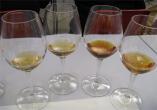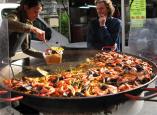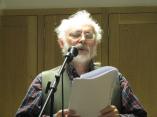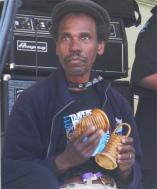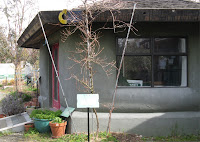In scrambling to finish reading a library book (The Art of the Commonplace: The Agrarian Essays of Wendell Berry) I came upon an essay called The Pleasures of Eating, which I was happy to find as well at the Center for Ecoliteracy website, which has a cornucopia of great Writings Online. (Scroll down to the Thinking Outside the Lunchbox heading to find lots of food articles.)
The nuggets in this essay include guidance for today’s consumer of industrial food, who as Berry says
is one who does not know that eating is an agricultural act, who no longer knows or imagines the connections between eating and the land, and who is, therefore, necessarily passive and uncritical – in short, a victim. When food, in the minds of eaters, is no longer associated with farming and with the land, then the eaters are suffering a kind of cultural amnesia that is misleading and dangerous.
This happens because, in the interests of those who make money – a great deal of it – producing, selling and marketing industrial food to us, regardless of the damage it does to the land, the community and the body,
…The consumer… must be kept from discovering that, in the food industry – as in any other industry – the overriding concerns are not quality and health, but volume and price.
Suggestions to help us repair this cultural amnesia include:
1. Participate in food production: grow something.
2. Prepare your own food.
3. Learn the origin of the food you buy and buy the food produced closest to your home.
4. Whenever possible, deal direct with local farmers, gardeners and orchardists.
5. Learn in self-defence as much as possible of the economy and technology of industrial food production.
6. Learn what is involved in the best farming and gardening.
7. Learn as much as you can, by direct observation and experience if possible, of the life histories of the food species (plants & animals).
In another of the essays in this book, Feminism, the Body & the Machine, I was most interested in his views on technology. It was his public decision not to use a word processor, and the public response to this decision, that brought the essay about. Here is what he thinks, overall, of technological progress:
…apart from its own highly specialized standards of quantity and efficiency, “technological progress” has produced a social and ecological decline. Industrial war, except by the most fanatically narrow standards, is worse than war used to be. Industrial agriculture, except by the standards of quantity and mechanical efficiency, diminishes everything it affects. Industrial workmanship is certainly worse than traditional workmanship and is getting shoddier every day. After forty odd years, the evidence is everywhere that television, far from proving a great tool of education, is a tool of stupefaction and disintegration. Industrial education has abandoned the old duty of passing on the culture and intelligence inheritance in favor of baby sitting and career preparation.
And the point of all this damage:
The higher aims of “technological progress” are money and ease. And this exalted greed for money and ease is disguised and justified by an obscure, cultish faith in “the future”. We do as we do, we say, “for the sake of the future: or “to make a better future for our children”. How we can hope to make a good future by doing badly in the present we do not say… A good future is implicit in the soils, forests, grasslands, marshes, deserts, mountains, rivers, lakes, and oceans that we have now, and in the good things of human culture that we have now; the only valid “futurology” available to is is to take care of those things.
A perceptive point about “ease” – we’ve been sold such a bill of goods about ‘labour saving devices’ and the efficiency of technology. How many hours have we all wasted waiting for computers to reboot, projectors to connect with laptops, video recorders to be set up, engines to be repaired? And still we find with all this mechanical help, we’re working more and more hours in dreadful soul-destroying jobs in order to pay for consuming all this disposable and destructive technology.
By the way, I found a couple of links to people and agencies mentioned in A Farm for the Future:
Agroforestry Research Trust (Martin Crawford)
Richard Heinberg and the Post Carbon Institute (whose Food and Farming Transition: Toward a post carbon food system document will have served as some of the source material for the film script, I reckon).
Colin Campbell and ASPO Ireland (Association for the Study of Peak Oil & Gas Ireland) and ASPO International


